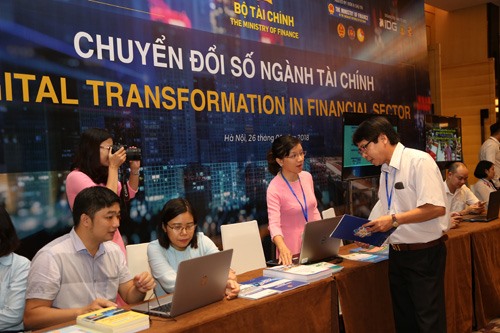The Ministry of Finance will apply the technological achievements of the fourth industrial revolution (Industry 4.0) to build a smart governance foundation, provide financial services and participate in the development of digital economy.

The Ministry of Finance will apply the technological achievements of the fourth industrial revolution (Industry 4.0) to build a smart governance foundation, provide financial services and participate in the development of digital economy.
There are the goals of the ministry’s Resolution 02-NQ/BCSD on the application of the 4.0 industrial revolution’s technology in the fields of finance and budgeting, said Deputy Minister of Finance Vu Thi Mai at the Viet Nam Finance Conference and Expo 2018 held in Ha Noi on Wednesday.
“The ministry will complete work to build e-finance and establish a modern, sustainable, open and transparent digital financial platform based on big data, open financial data and the digital financial ecosystem, meeting the demands of public financial transactions and the needs to use the digital information of the Government, people, enterprises and organisations,” said Mai.
Mai said the meeting would be a good forum for State bodies, researchers and the business community to discuss the financial industry’s requirements in implementing the Industry 4.0, e-government and digital transformation.
“Through this, domestic and international businesses and organisations can capture information on the financial sector deployment plan, thereby recommending technology, experience and best practices to the ministry,” she said.
According to Mai, Industry 4.0 brings many opportunities but also challenges to countries, especially developing countries like Viet Nam, in applying digital technology, intelligent technology and new production and business solutions to promote the economy.
In order to take advantage of opportunities and minimise challenges from Industry 4.0, Mai said Viet Nam should promulgate synchronous mechanisms and policies for the development of industries and fields related to Industry 4.0.
“The tax and financial policy system plays an important role in mobilising, allocating resources and assisting enterprises, organisations and individuals to participate in the Industry 4.0, as well as applying scientific and technological advances to develop production and business, contributing to economic growth,” said Mai.
Deputy Minister of Information and Communications Nguyen Thanh Hung said the digital transformation would take place in a way that is "not smooth". The challenge for digital transformation in Viet Nam would be resources and skills, culture and perception, security and network security.
“No matter whether Viet Nam conducts the digital transformation, when the Industry 4.0 arrives, the country will certainly be affected,” said Hung.
The conference has become a prestigious information technology forum in the field of public finance held annually since 2004. The event this year introduced the roadmap for investment and implementation of the digital transformation of the financial sector. It also exchanged experience and applied advanced technology solutions of Viet Nam and foreign countries, contributing to strengthening effectiveness and transparency in financial management, and moving towards an advanced and modern digital economy.
The conference consisted of one plenary session and three thematic sessions including digital transformation in the State Treasury, customs sector and taxation. In addition, the exhibition area provided real-world experiences on modern IT models, products and solutions to help advance the process of building the digital economy. — VNS





